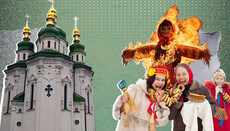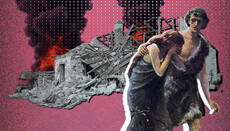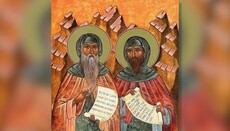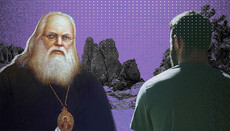Spiritual antivirus: How Elder Paisios teaches to "cut off" thoughts

St. Paisios of Mount Athos on combating "rubbish" in the head. How the "scissors method" and humility help to overcome informational noise and find the peace of Christ.
The series of dialogues with saints and elders continues. And today our guest is the renowned spiritual father from Mount Athos, St. Paisios the Athonite. The words and letters of the saint remain relevant for all times. He is practically our contemporary, which means the problems and spiritual needs we face in everyday life are well known to him.
Today we will talk with the elder about how a Christian should live in the era of digitalization. But first, a few lines about the life path of the geronda.
Our interlocutor is Elder Paisios the Athonite
St. Paisios (in the world Arsenios Eznepidis, 1924–1994) is one of the greatest and most revered Athonite ascetics of the 20th century.
Born in Cappadocia (Asia Minor) and having served as a radio operator in the Greek army, he chose the monastic path, practicing asceticism on Mount Athos in the monasteries of Esphigmenou, Philotheou, and finally in his famous cell, “Panagouda”.
Not being a priest, Elder Paisios became a spiritual father to thousands of people from all over the world.
Every day, hundreds of pilgrims – workers, students, hierarchs, and scholars – would flock to his humble cell.
Possessing the greatest gift of discernment, love, and foresight, he gave simple yet profoundly accurate answers to the most complex questions of modern man. His teachings, collected in six volumes of "Words", are not dry theory but the living experience of a person who has attained true holiness and the peace of Christ. In 2015, Venerable Paisios was canonized.
"Heads overloaded with clutter": the danger of digital noise
In an era of continuous information flow – news, social networks, aggressive advertising – a person loses the most valuable thing: inner peace. Waking up in the morning, the first thing we take in hand is not a prayer book, but a smartphone. And there are endless chats, work tasks, weather forecasts, flashing headlines of the yellow press...
By the time we look through all this, it's already close to the start of the workday, and the prayer book continues to gather dust on the shelf.
"I'll pray on the way to work," our naive mind convinces us, but in reality, everything happens quite differently. Shop windows, advertising banners, marketplace promotions, morning coffee in haste... What kind of prayerful spirit is there? And then – work, tasks, and everyday routine. And at the end of the day, when our strength is nearly gone, we blame ourselves for not having been able to utter even a brief Jesus Prayer amid all the hustle and bustle.
Elder Paisios the Athonite, although he lived without the Internet, perfectly saw and described the state of a person overloaded with unnecessary information. He warned that such a life makes us nervous, distracted, and vulnerable to the main enemy - thoughts.
"In the past, people had the opportunity to have a good disposition, their thoughts were occupied with good. But today everyone has become nervous and cannot come to themselves. People have filled their heads with garbage. They don't want to listen to anything spiritual because their heads are overloaded with worldly, worthless clutter," the elder laments.
The geronda reminds us that a Christian’s main battle is not on an external battlefield, but within—inside the mind and heart. And the chief enemy in this struggle is thoughts, which, like computer viruses, steal our joy and faith.
"Scissors method": how to cut off virus-thoughts
Software developers spend months or even years devising “antidotes” for the various “infections” that enter gadgets from the global network. For a person, however, the harm is caused by “viruses” of toxic information that infiltrate the mind. In such cases, many rush to psychologists with substantial sums of money to free their heads from the growing overload.
Abba Paisios offers us a free method of "digital detoxification", which can be called the "scissors method".
"You should not argue with a thought, but you should cut it off," the elder instructs. "If you start arguing with it, it will confuse you. It will tell you: 'I'm right!' – and you: 'I'm right!' – and so you will waste time, and another thought will come, and you will have to argue again, and this will continue endlessly. Therefore, the thought must be cut off immediately."
The basis of Elder Paisios's spiritual "antivirus" is the skill of cutting off a thought at the moment it is born or comes from outside. If you let it grow, it will turn into a passion.
This method is especially important when we read news or encounter judgmental information. With spiritual "scissors" or even more – a spiritual "scalpel" – we will mercilessly cut out all the festering wounds in the soul caused by toxic “messages”.
By not allowing a thought to develop, we maintain inner peace. According to the elder, even if thoughts come, they should not "find a hotel in us", that is, they should not be welcomed and developed.
But what to do if an impure thought has still penetrated inside?
"Do not argue and immediately turn to God," Abba instructs. "After all, arguing with a thought is like trying to stop a sea storm. It's better to retreat immediately and ask for help from above."
The main weapon - the "spiritual vaccine" of humility
How to counteract the flood of various information, the flow of which overwhelms us daily? Elder Paisios is confident: the most powerful weapon against negative thoughts, especially pride and judgment, is not external struggle, but internal humility, expressed in self-condemnation. This is the spiritual "vaccine" that makes the soul immune to temptations.
"Do you know what the best protection is? When a person condemns himself. Then no fortress is needed. If you condemn yourself, the enemy has no access to you and cannot disturb you with thoughts," the geronda convinces.
Indeed, being overly carried away by the mental consumption of other people's news, we forget to regularly review the "news feed" of our soul. And there we can find a lot of "interesting" things: from small thoughts of malice to decisive intentions to fall into some serious sin.
Elder Paisios strictly warns us against such carelessness:
"We must be occupied with our spiritual rubbish and not look at the rubbish of others. He who constantly looks at the sins of others will never see his own. And if he does not see his own, he will not repent."
How to find the peace of Christ in the hustle and bustle
At out first meeting, St. Paisios the Athonite gave spiritual advice that can be boldly called the basic principles of "digital asceticism". He does not call all laypeople to become hermits but recommends finding inner peace and joy amidst worldly hustle and bustle. This peace is the sign of victory over informational and spiritual noise.
The task remains simple: decisively "cut off" thoughts, reproach ourselves for laxity, and ask for God's help. This is the "spiritual antivirus" of St. Paisios. We eagerly await another soul-saving meeting with Abba, and today he sends us off with this farewell:
"The goal of spiritual struggle is to come to a peaceful state so that Christ reigns in the soul. When there is peace in the soul, then a person rejoices, despite any difficulties and temptations."











